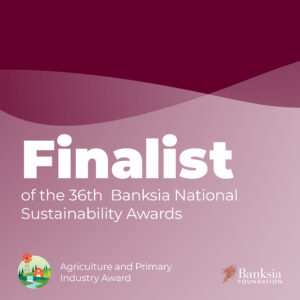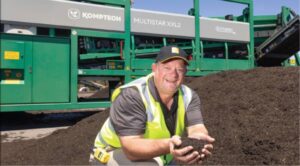Julie Lloyd decided to get into the olive oil business on the family property on the Cape Naturaliste Road at Eagle Bay just west of Dunsborough. Her research indicated that the climate and soils suited this biblical crop. Her training in Microbiology gave her skills which were necessary in uncovering information from, what was then, an extremely limited pool of local know how.
She obtained trees from Louis Bazzani of Olea Nursery in Manjimup, along with lots of advice. “Lou” as he is better known comes from Tuscany and is credited with being the godfather of commercial olive growing in WA.
The soil was however on the extreme edge for growing even olives. Deep banksia sand covered most of the property and the pH test revealed a hyper acidic result. Olives planted on the next door property at the same time are today stunted, unproductive bonsais.
In 1997 the first trees went in and were immediately sand blasted by unusually strong coastal winds and then attacked by grasshoppers. These tough trees survived and went on to produce their first crop of oil a few years later. With 1200 trees planted at 6 by 4 spacings, which was the norm at the time, it very soon became apparent that the farm was going to be uneconomic, if selling wholesale olive oil was the basis.
Diversification became the path to business survival. In 2006 Julie opened her store and began selling oil and table olives to the tourists and well healed locals who were passing her gate on the way to some of the most exclusive beachside addresses in WA.

Her retail offer has grown over the years and now includes olive wood kitchen utensils, olive themed tea towels, olive serving plates and bowls. For the passing tourist market Julie introduced a Farm Picnic Box consisting of local cheeses, breads, venison Chorizo plus her own olives and oil. A garden area complete with lawns, shady seating and a pet donkey, for entertainment, have made a terrific spot for a picnic lunch.
Today olive oil is sold in 5 different size containers. Included in the lineup are two lines of casks which prevent oxidation of the oil as it is being used. This is an innovation in the industry as even glass and popular tin containers allow air to enter as some of the oil is poured off. Freshness is what makes top end Australian olive oils the equal of the best in the world.

The trees next door prove that olives can survive without soil improvement, mulch, fertiliser and additional water. However, to grow a commercial crop in WA ,irrigation is essential. Julie said – “water is more important than fertiliser in the growth of the olive tree and the quality and quantity of fruit”.

There is no access to underground water so all the requirements must be met from surface water and is captured in seven dams, of various sizes, spread around the property. In order to make better use of the seasonal water resources Julie made contact with Agronomist Deb Archdeacon who works closely with C-Wise.
Deb first met Julie and Peter in February 2013 and reported that the soil consisted of coarse water repellent sand, it was hard to detect any soil moisture at all and the fruit was small and crinkled and appeared to be suffering water stress.
Soil tests at the time revealed showed good levels of calcium and magnesium and a neutral pH (after years of liming ). All other nutrients were way too low for successful cropping. Soil carbon and clay levels were also low so the challenge was to add moisture and nutrient holding capacity to the soil so that inputs would actually help the trees to grow and produce.
Soil tests of a mound of clay from a dam excavation on the property showed promise and this was later placed around each of the trees, underneath a layer of EcoMulch from C-Wise, applied at a rate of 1/4 of a cubic metre per tree. This combination showed immediate results in terms of cooling the soil. Fertiliser on the grove is applied through the irrigation lines in a soluble format. Fish and other organic inputs were used in conjunction with inorganic fertilisers.

A year later soil tests showed that the amount of Nitrogen in the soil had tripled, this element is the major driver of growth so this was a positive result. Soil carbon increased from 1.7% to 2.01% which sound very small but uncultivated soils in the area often produce results of .7 to 1% so this too was heading in a good direction. The big payoff of increases in soil carbon is that it fires up the native biology in the soil to really enhance plant performance. These positive results after 12 months meant that expensive inorganic liquid fertilisers could be reduced.
Testing early in 2015 has shown that nitrogen levels have increased three times the previous years reading. Soil carbon has gone up to 5.73% which is a three fold increase compared to 2013 results. To my eye the trees look in excellent condition they are heavily laden with crops which are fattening up by the day. The goal now is to get the underground biology to move the improved soil further down into the root zone. Cover crops are being grown between the rows to protect the soil from evaporation losses and to add more soil carbon. Deb says “While water will always be the major limiting factor, the addition of composted mulch has made very large differences to the health of the soil and the trees. Without its cooling effect and a habitat for the critters, the earth under the olive trees would have continued to bake beneath the hot Aussie sun.”
Julie’s husband Peter paid Deb a great compliment on my visit. “She was the first agronomist that seemed to understand the challenge they faced and the only one he could understand when it came to following the plan of improvement”.
I learned a good deal on the day of the visit too. The first was the furfy that the low smoking point of olive oil made it unsuitable for frying. Julie informed me that the smoking point of Extra Virgin Olive Oil is 230 degrees Celsius and deep frying is done at 200 degrees. Julie recommends that everyone eat a Mediterranean diet which includes 2 tablespoons of EVOO as it’s often called, per day. She also suggests removing all vegetable oils from the pantry because they are all heat processed. Only olive and avocado oil are unrefined and cold pressed to preserve all their healthful characteristics.
I also discovered that I simply love the flavour of Manzanillo olives as a table fruit.

Eagle Bay Olives PO Box 40 DUNSBOROUGH 6281 Fax 9755 Farm Shop 521 Cape Naturaliste Rd Eagle Bay 9755 3188
www.eaglebayolives.com.au







